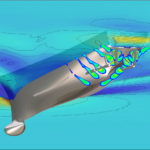On Demand concepts have become ubiquitous and are also applied in the field of High Performance Computing. With regard to ship development and optimization computing power on demand is already in successful use
Nowadays shipbuilding companies face similar challenges like other comparable high-tech fields do: among others, efficiency, quality, reliability and positive[ds_preview] environmental performance have to be realised at the lowest possible costs and minimised lead times before bringing any product onto the market. Only if these requirements can be transferred into a successful product, satisfactory positioning in global competition is possible. This can only be achieved by using latest methods already in development and optimisation stage in product design process. In terms of shipbuilding numerical simulations are firmly established as standard tools. Especially problems regarding structure and fluid flow as well as its interdependencies have been constantly and successfully analysed since years by using Computational Structural Mechanics (CSM) and Computational Fluid Dynamics (CFD). Also new areas are continuously added, e.g. NVH (Noise, Vibration, Harshness), supplemented by innovative procedures of the automated grid generation, including adaptive adjustments to show stipulated geometries and occurring structural and flow phenomena in an optimal way. Up-to-date, particularly commercial methods of numerical simulation are able to meet requirements of modern ship development and ship optimisation processes. However, essential prerequisite is not only the application software but also the appropriate High Performance Computing resources. Specific applications, like simulation of large models with a very high number of grid points, CFD-driven design optimisation with necessary innumerable variations, e.g. in geometry optimisation, as well as complex, multidisciplinary problems regarding the simulation of iterative interactive effects are typical examples of getting efficient, high-quality, prompt and precise results only through appropriate High Performance Computing. Generally and for process-related reasons FEM-simulations have a high demand for Random-Access Memory (RAM).
Current requirements are more than 8 GB RAM per CPU core. Definitely more than even most powerful workstation systems can handle, whereas the latest HPC systems offer RAM in the range of terabytes. Due to the fact that solvers of typical commercial processes become more scalable, these applications can be parallelised and thus be speeded up significantly on thousands of cores with hardly any loss of performance. Within relatively short time highly idealised models can now be simulated with sufficient precision in a more realistic manner. Not every company is in position to provide such resources in an appropriate amount or – if available at all – to use them continually and efficiently. The necessary infrastructure, especially with regard to technical and personal resources, is cost-intensive and time-consuming. So why not renting required computing capabilities, in other words to make use of HPC On Demand? Why not paying only project related costs?
HPC On Demand is a reliable way to absorb project driven peak loads with as little effort as possible. CPU 24/7 as an on demand provider of HPC systems and comprehensive computing capacity enabling companies of every size to activate and make intensive use of scalable computing resources for every situation. For a specified period of time resources can be used flexibly in any amount. The advantages of this concept are clear:
Users have demand-based and dynamic access to scalable HPC resources on latest hardware and software with short provisioning times guaranteed.
No initial and follow-up costs for resources, licenses and staff occur. The settlement of HPC On Demand utilisation is based on the actual consumption.
Through the application of more powerful computing resources results can be achieved faster and due to this fact it is possible to take more efficient advantages of licenses.
An extensive range of service and support facilities gives engineers more scope for focussing on own core competences. The HPC provider assumes license management, establishment of a simulation environment and selection of suitable hardware configuration.




















